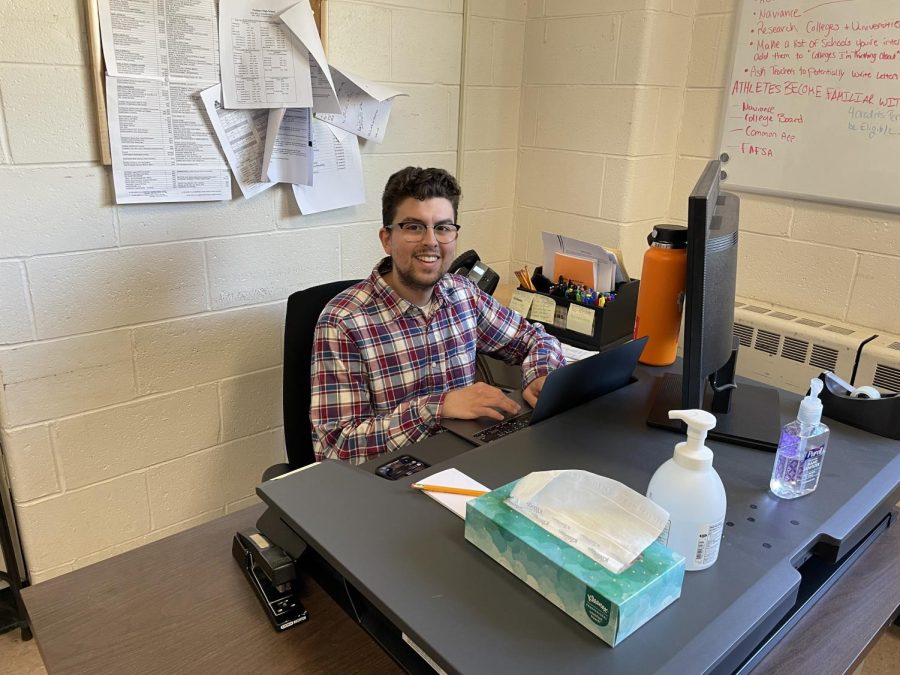In the Shoes of a Counselor at DHS
March 30, 2023
Imagine constantly checking emails, looking at PowerSchool, arranging schedules, and attending meetings all while managing 300 students at once. Welcome to the life of a counselor at DHS. What to many seems like an easy going desk job is in reality a job that requires a lot of responsibility, time management, dedication, patience, and a sense of empathy. For counselors every day is met with a new challenge or circumstance which is why they must be prepared to face the unexpected. Many people wonder what the life of a counselor actually looks like, which is why I got an inside look from counselors Thomas Rello and Katherine Lehv on some of the aspects of their job.
One of the biggest challenges that comes with the job is managing a large student population. Although each counselor gets their fair share of students, the amount of work that is required to meet the needs of every one of them can be to a great extent. “It’s very challenging,” said Ms. Lehv. “It’s not easy but I just have to prioritize the best I can with all of the duties that we have and all of the tasks that we have to do. So it takes a lot of prioritizing and organizational skills.” Numerous students contact their counselors on a daily basis, which is why prioritizing is an important aspect of the job. “My biggest focus this year being a first year school counselor is making sure all seniors are good for graduation,” said Mr. Rello. “Which is why I pull all my seniors in, I make sure I look through all graduation requirements. Students that transfer that might have some sort of credit issue. I make sure to resolve that as soon as possible so that there’s no surprises towards the end of the year.” Both counselors prioritize the graduating class as they recognize students must meet all credit requirements in order to graduate.
To make sure most students are on track, counselors typically follow a routine that consists of constantly monitoring PowerSchool while keeping an eye on students who are failing or close to failing is done on a daily basis. Quick check-ins with these students serve to help them turn their grades around or provide them with other future options like summer school or credit recovery. For Mr. Rello it’s all about creating an academic plan to get students to where they need to be. He acknowledges the importance of even the smallest conversations as sometimes students are not only struggling academically, but mentally as well. “It’s a challenge to try to make sure that everyone is staying on track,” said Ms. Lehv. “Especially when you have almost like 300 students, but we do our best with what we have, the resources we have, and the time we have.”
Counselors try their best to reach out to students on all grade levels as they face different needs. Most of the time their work focuses on preparing students for college, higher level courses, SATs, and as previously mentioned having regular meetings to check in with those who may be struggling with their grades and attendance. Constant support and communication are key to making a student feel understood and acknowledged. Though this becomes a problem when counselors don’t have enough time to build a connection with every single one of their students. “It’s hard creating rapports with every single student,” said Mr. Rello. “A s a counselor you want to do that… but having so many, there’s so many different things you have to do and take care of so it’s hard to create that rapport that you might want to have with all of your students.” Building a relationship with each student and remembering them is not always easy or possible as unfortunately under the given circumstances counselors have greater priorities to tackle. Ms. Lehv wishes she had the opportunity to meet with every student more than once, not just the few that she gets to see on a constant basis.
Another major problem that has risen as a result of the growing student population is the regularity of ELL students being placed in study halls and having to do credit recovery. DHS receives ELL students all throughout the year. Ms. Lehv emphasized that for those that come in the middle of the school year it becomes challenging to find electives that aren’t already full. In most cases it’s hard to find seats for them which leaves no option available other than a study hall. As a matter of fact, finding seats for students everywhere within the school for 9th graders is a current issue that counselors face. Mr. Rello mentioned that aside from not finding seats, the fact that most teachers can’t speak both English and Spanish comes to play a role in this issue. Classes that are taught half in Spanish and English, known as sheltered classes, tend to fill up very quickly. Meaning that some ELL students are left with the English speaking electives, making it hard for them to pass the classes they need for graduation. When mentioned the option of summer school, Mr. Rello discarded it, as it is done through a platform known as Edgenuity which is an English platform that does not provide any instructions in Spanish.
When it comes to transferring or new ELL students, Ms. Lehv takes some time to explain how the school system works, things like the schedule, credits, programs, etc. This is sometimes a challenge as she wants to provide her students with a thorough explanation of how schools work in America when she’s only given a short amount of time. “We also always try to when we get their transcript from their previous schools, give them as much credit as possible from their transcripts for classes that they’ve already taken,” said Ms. Lehv. This way ELL students don’t face much of a challenge when trying to meet certain credit requirements. As for Mr. Rello, he tries to do anything in his power to get his students into a class that they currently need. Counselors try their best to make any accommodations that will benefit their students, but they can only do so much.
The language barrier doesn’t define the success of ELL students though. Despite the fact that many come with little to no English skills, it all depends on how much effort and dedication they are willing to put in their classes. Ms. Lehv believes that it also depends on the support they receive in school and at home. She believes that if they take some English speaking classes it will help them progress more as it forces them to use their skills and to practice more.
“Every school within the US does not represent them as well as they should be represented and give them the assistance that they need,” said Mr. Rello. “I know that Danbury works very hard to make it a very equitable school and make it as possible for every student despite demographic to accomplish what they want and graduate.” Just like Mr. Rello Ms. Lehv acknowledges the importance of providing that support to the students. She understands that many of her students have faced a lot of challenges which is why she hopes that all of them know that she cares for them and wants them to be successful.
In terms of the academies, the distribution of students will be much better which will provide ELL students with more opportunities to succeed. As of now both counselors agree that hiring more counselors would be beneficial to the school, as it would take a weight off some of the counselors and allow the students to be dedicated more time and attention. Overall, from both counselors I was able to learn that an effective counselor is one who is always there for the students. Someone who is able to listen to the students and has the ability to take action for them. They lead their students to success not only on an academic, but on a personal level as well. The counseling department comes across new problems every day, but they try their best to provide each student with the education they need and deserve.





















